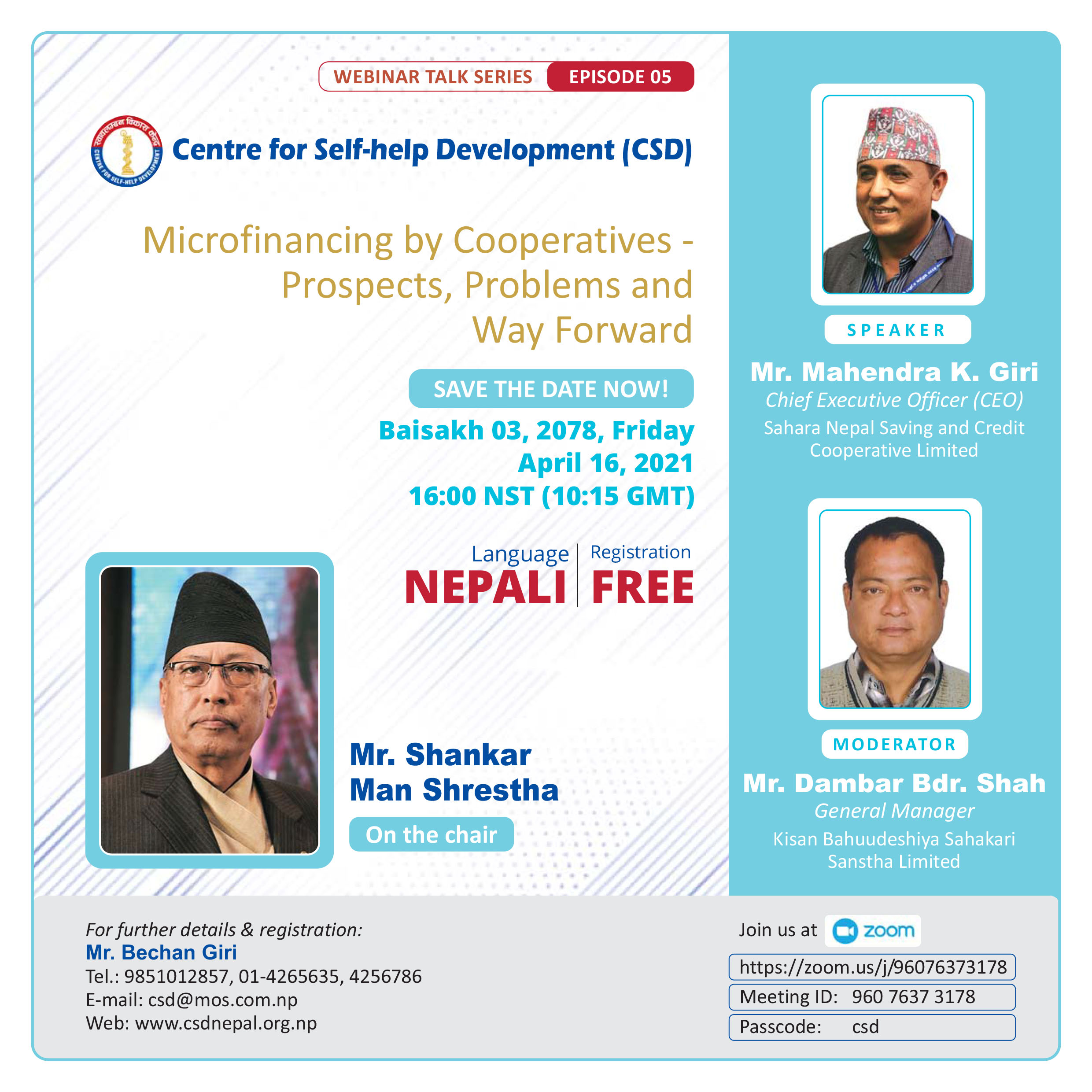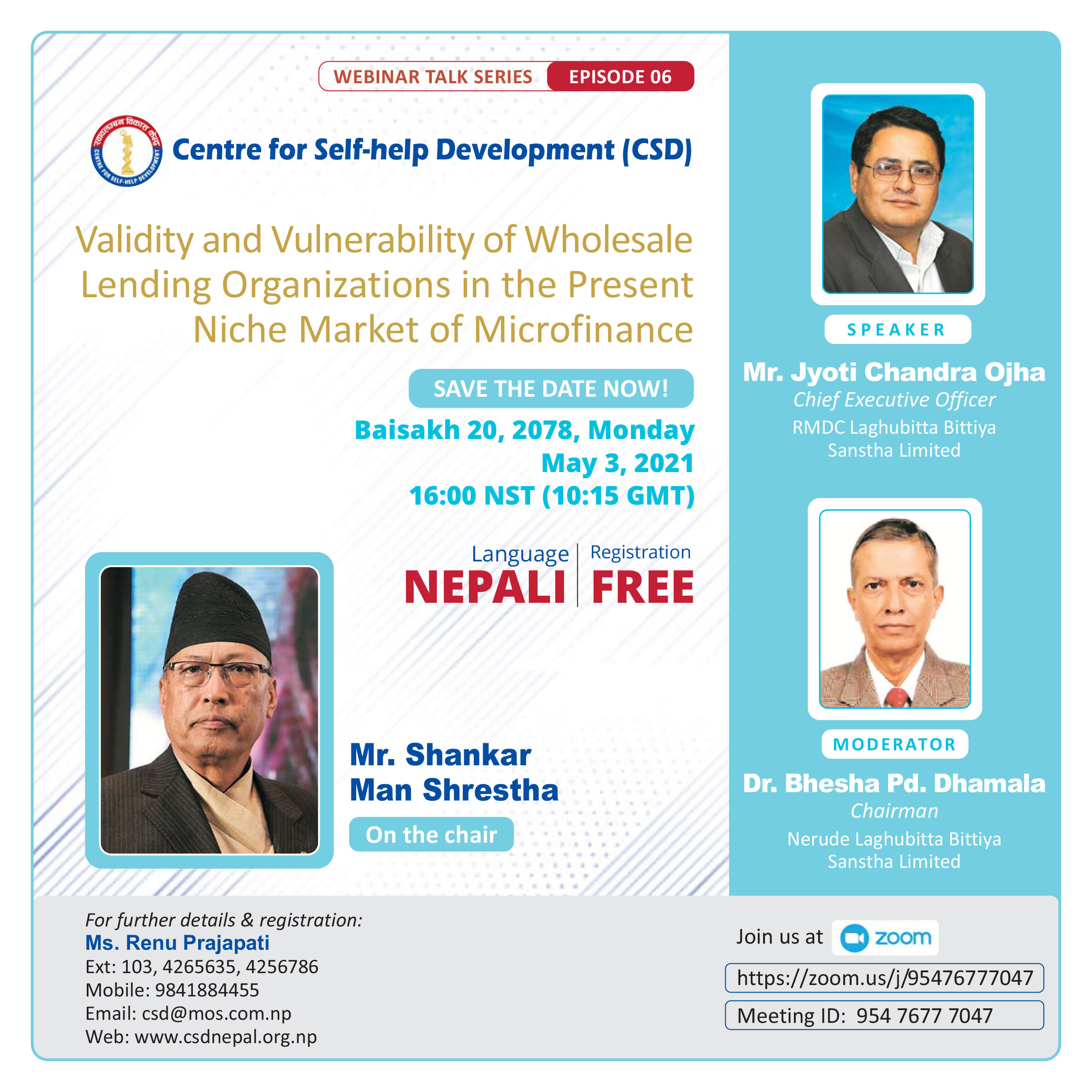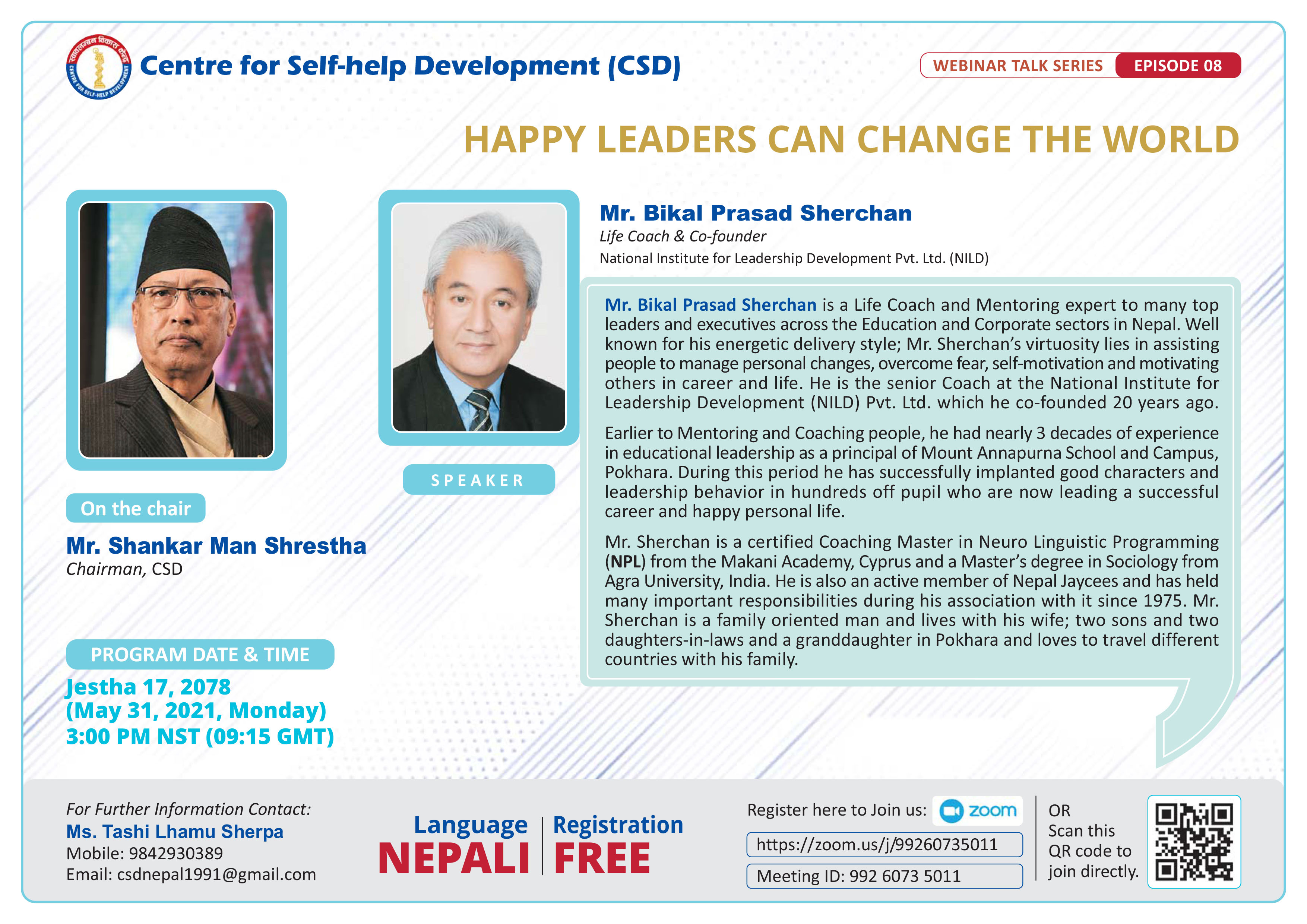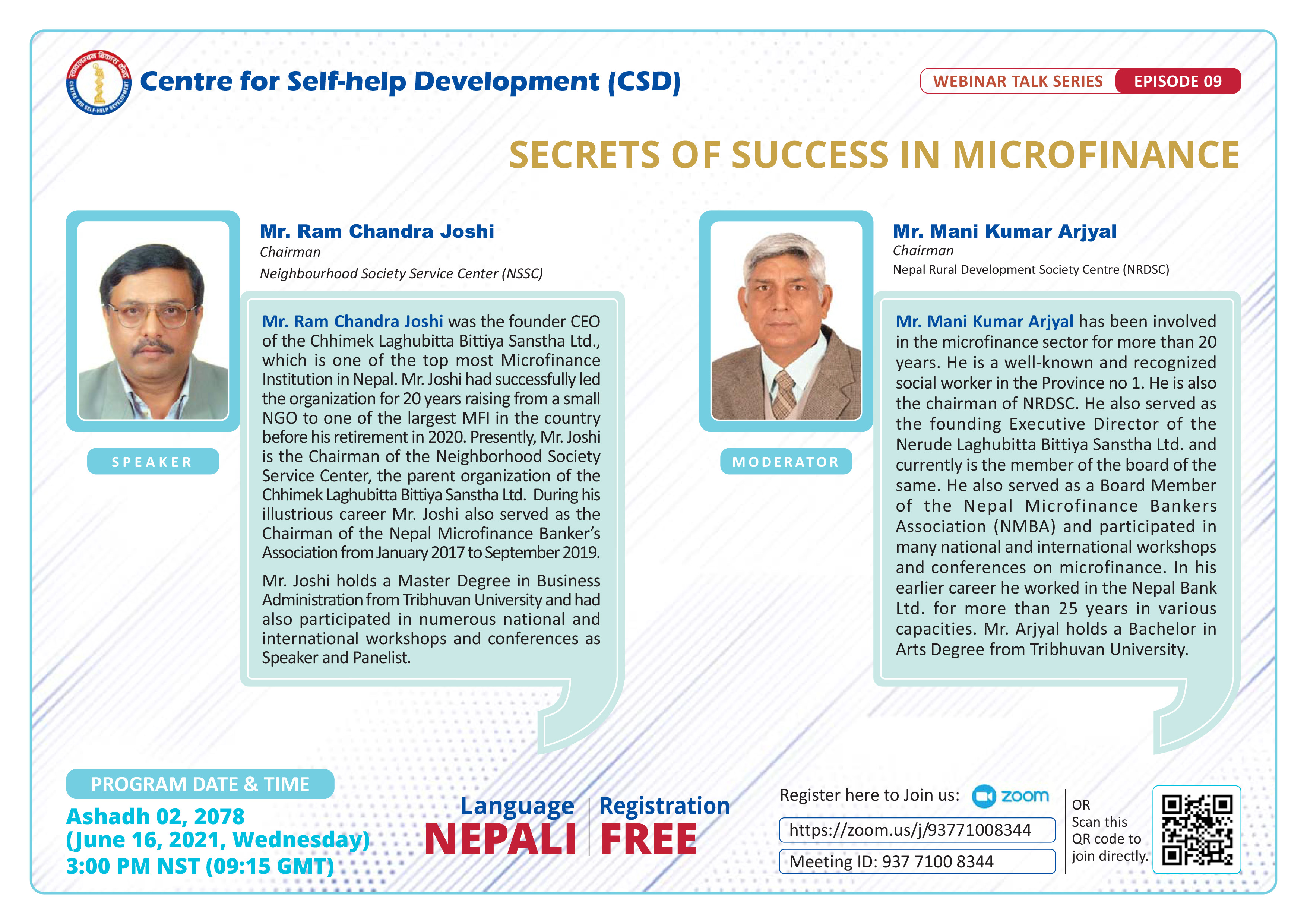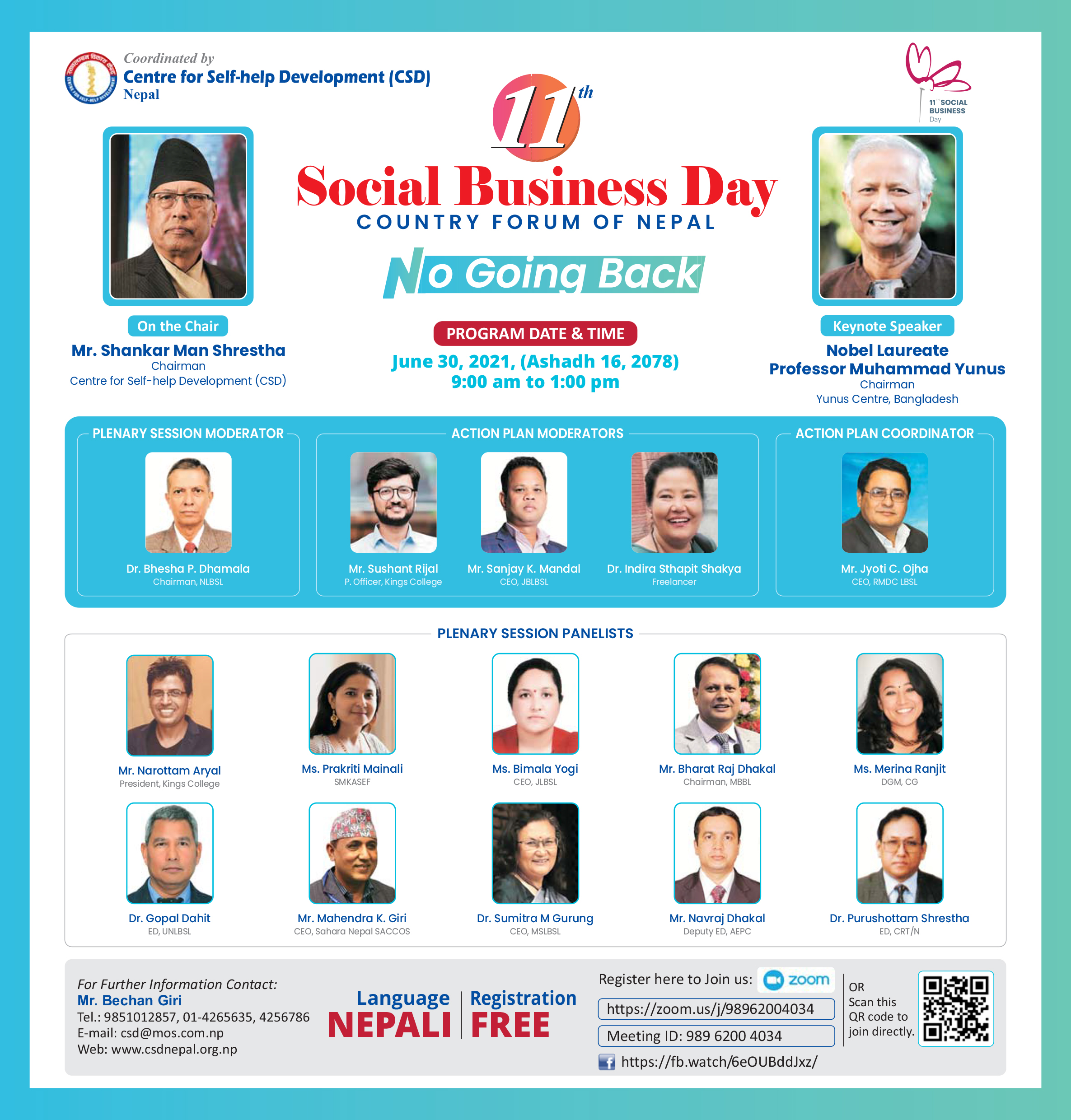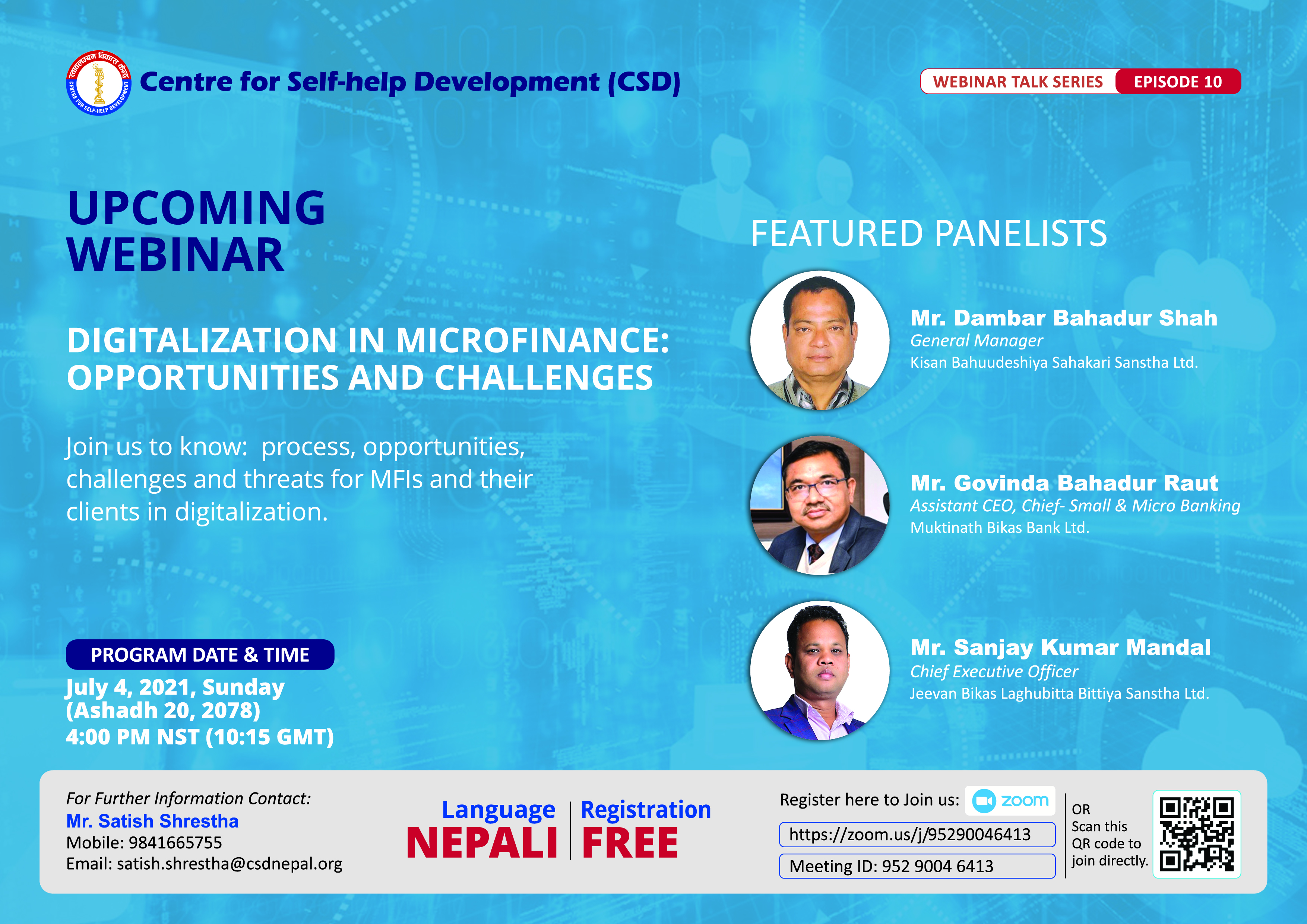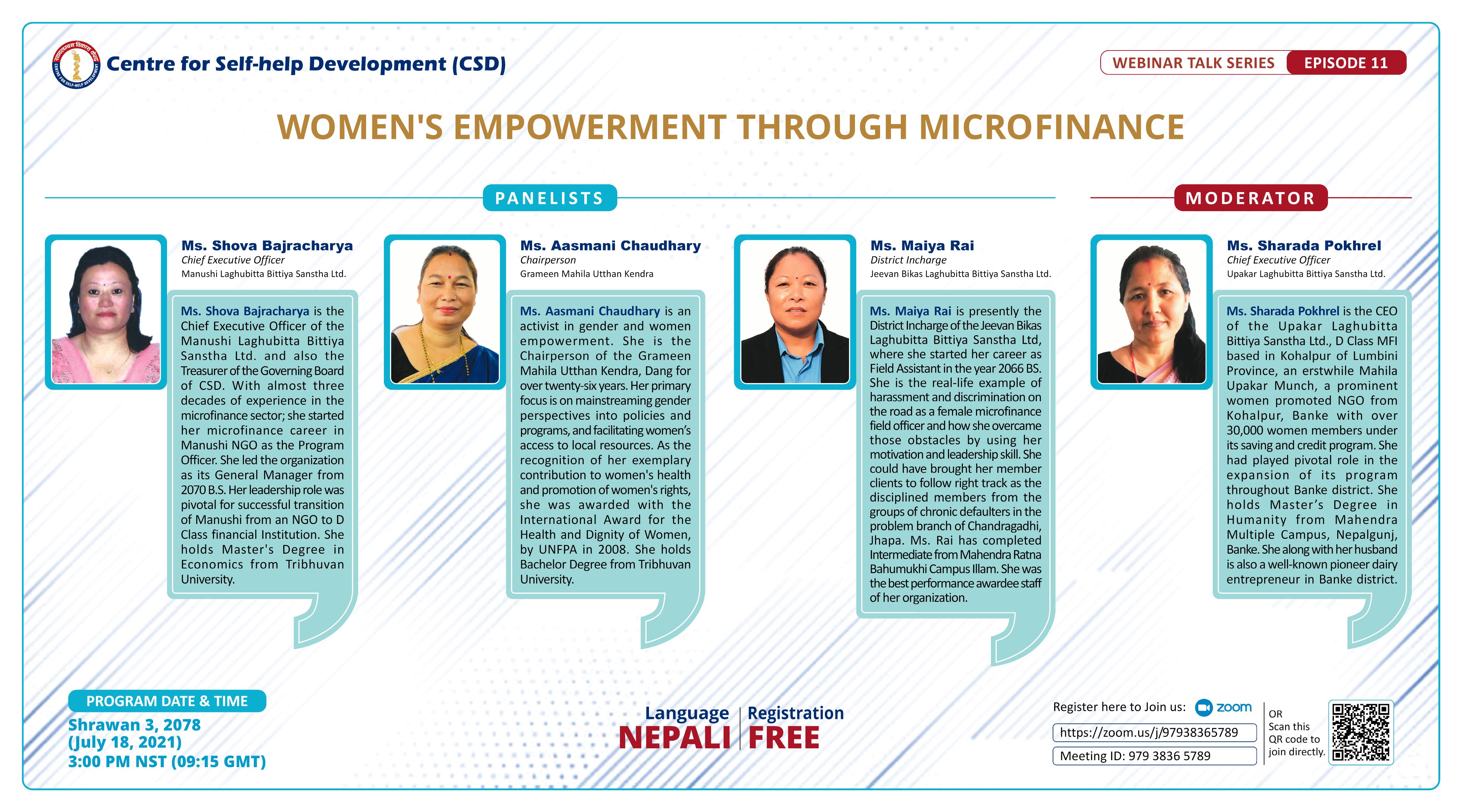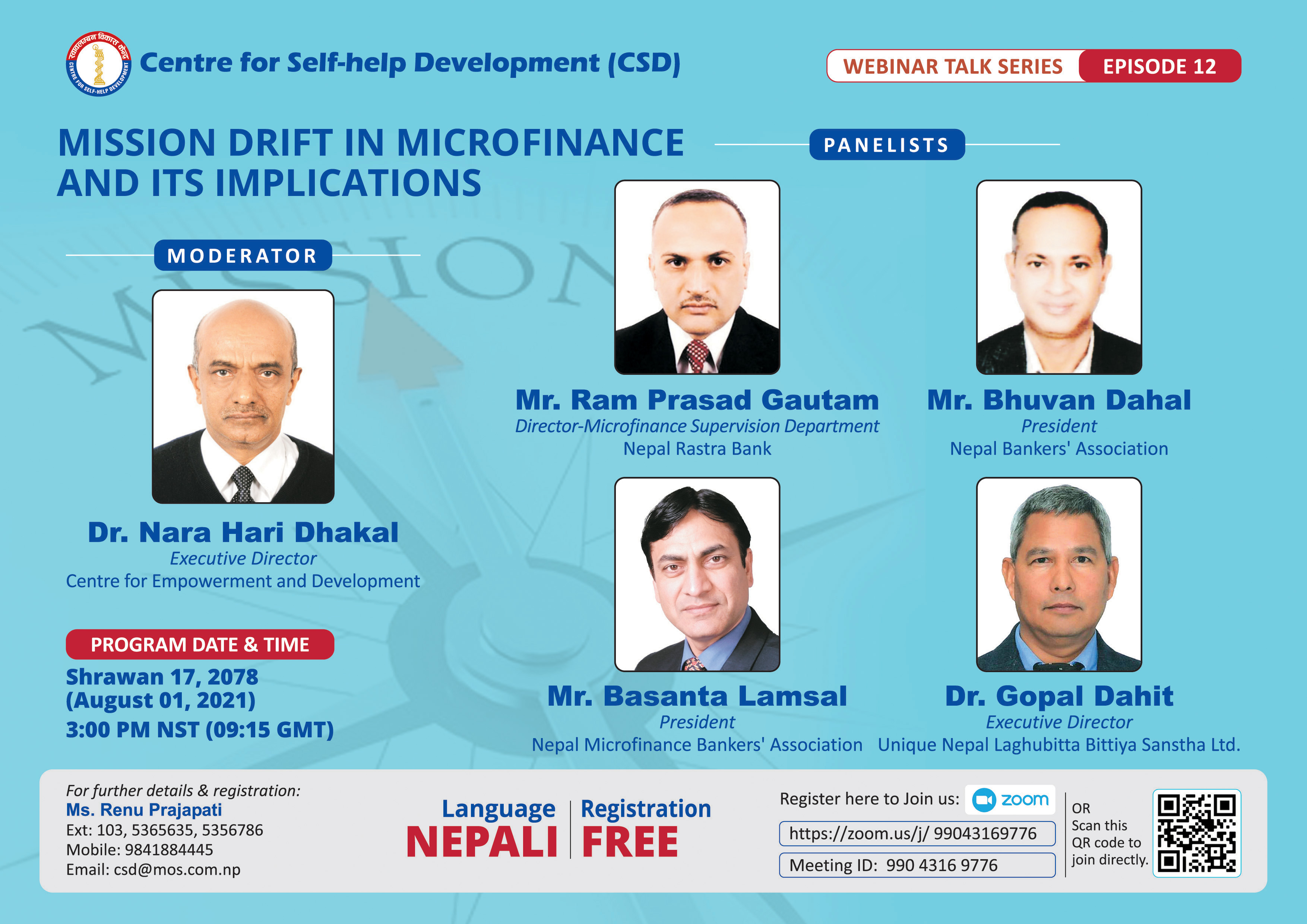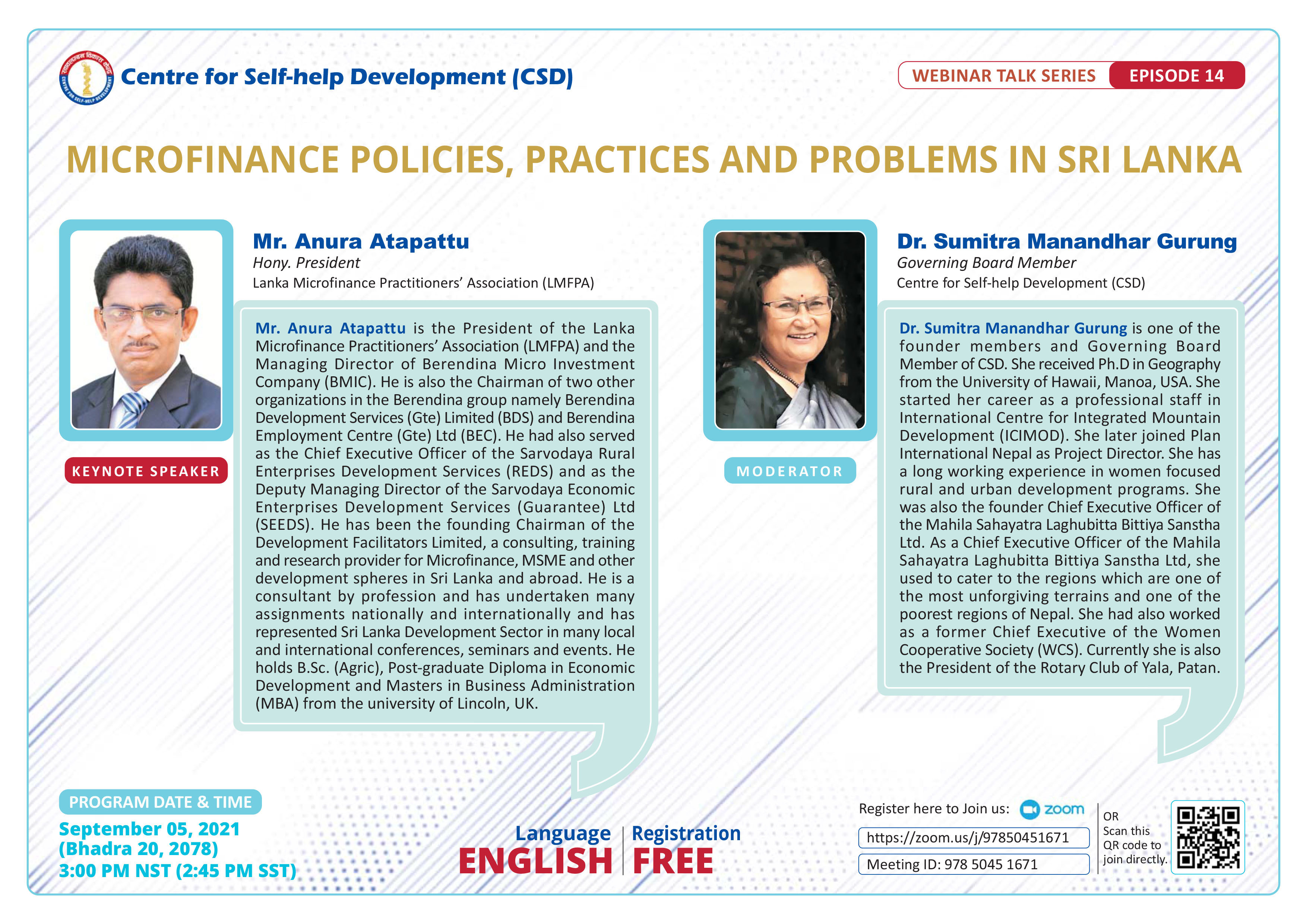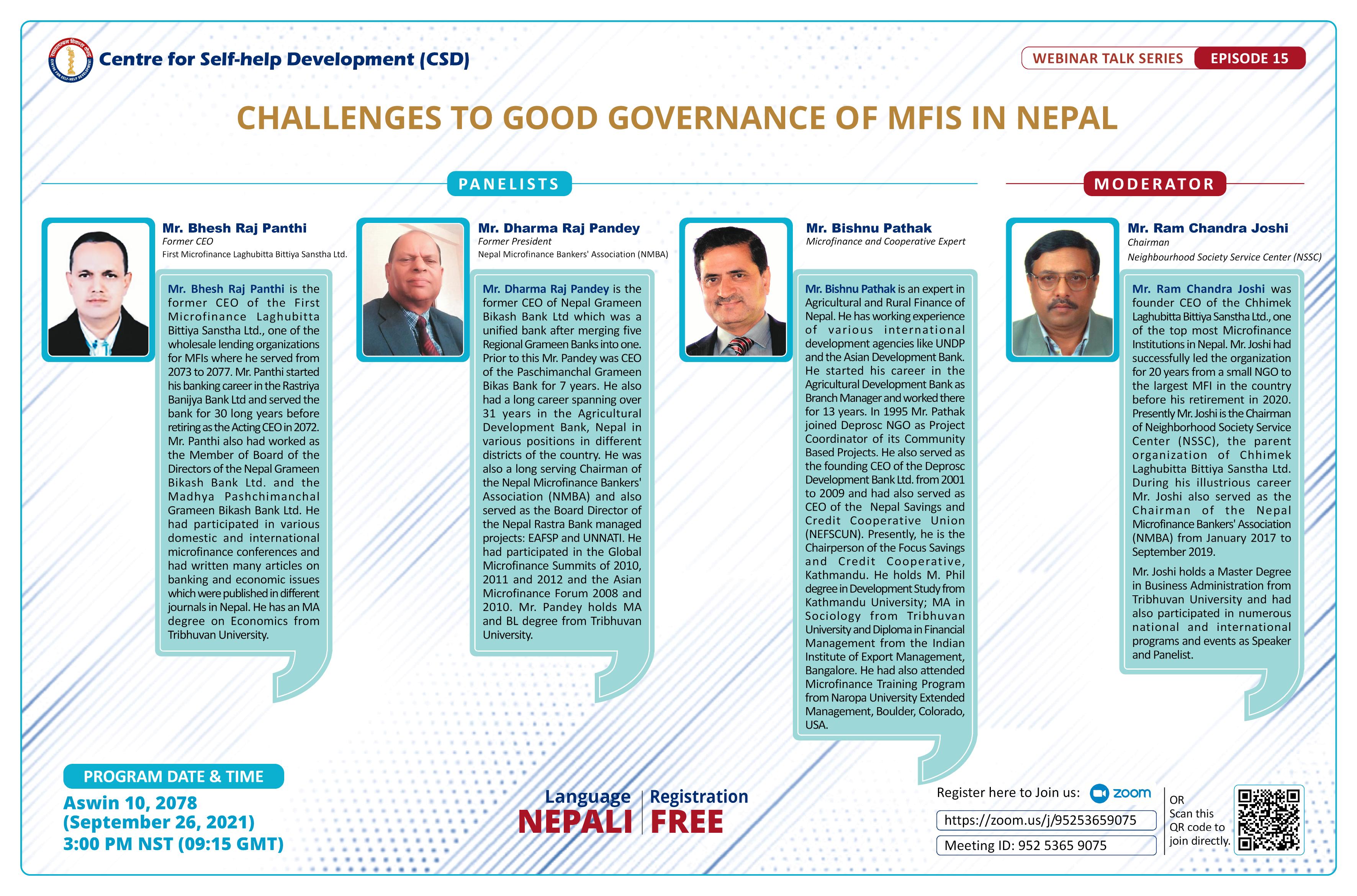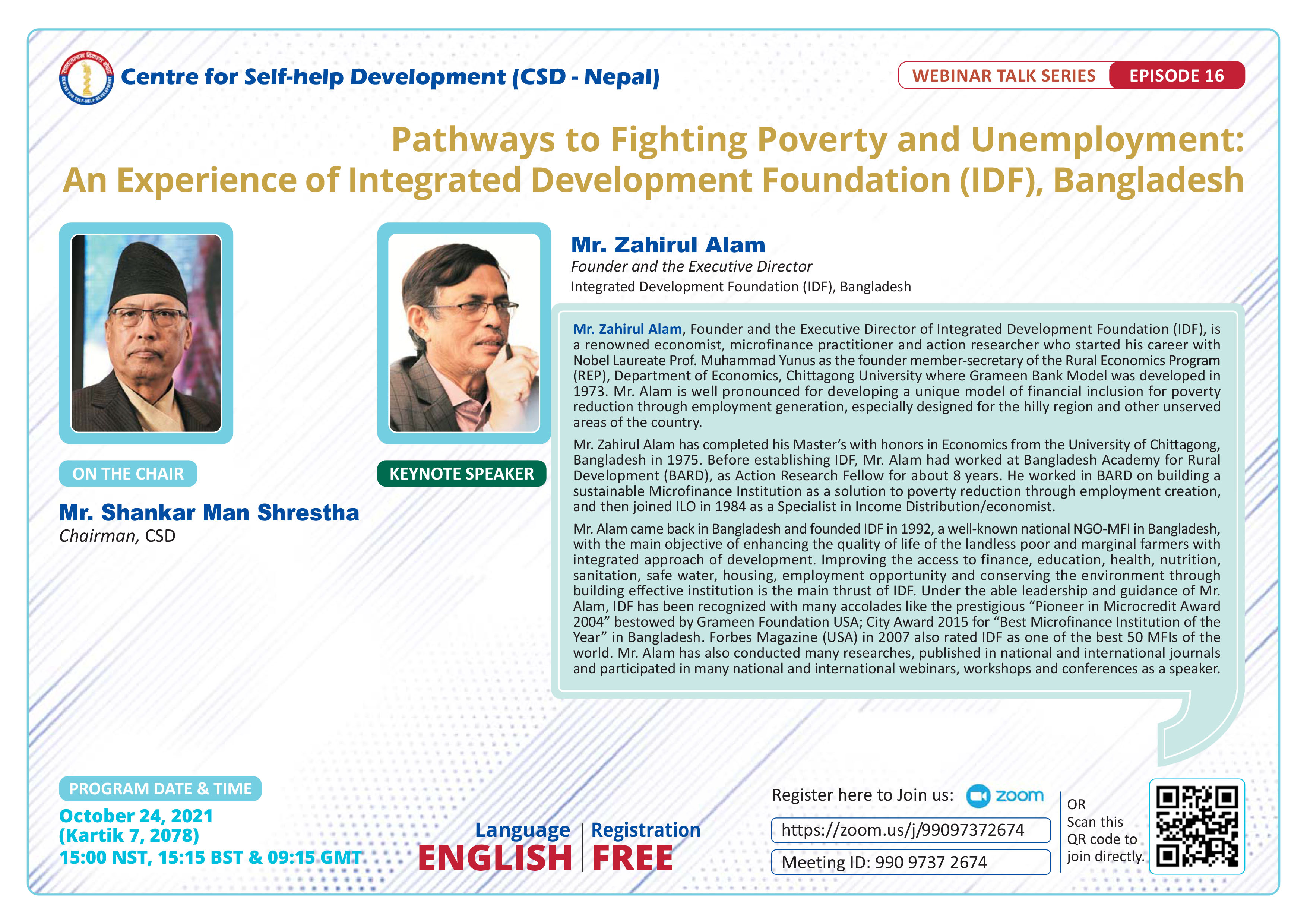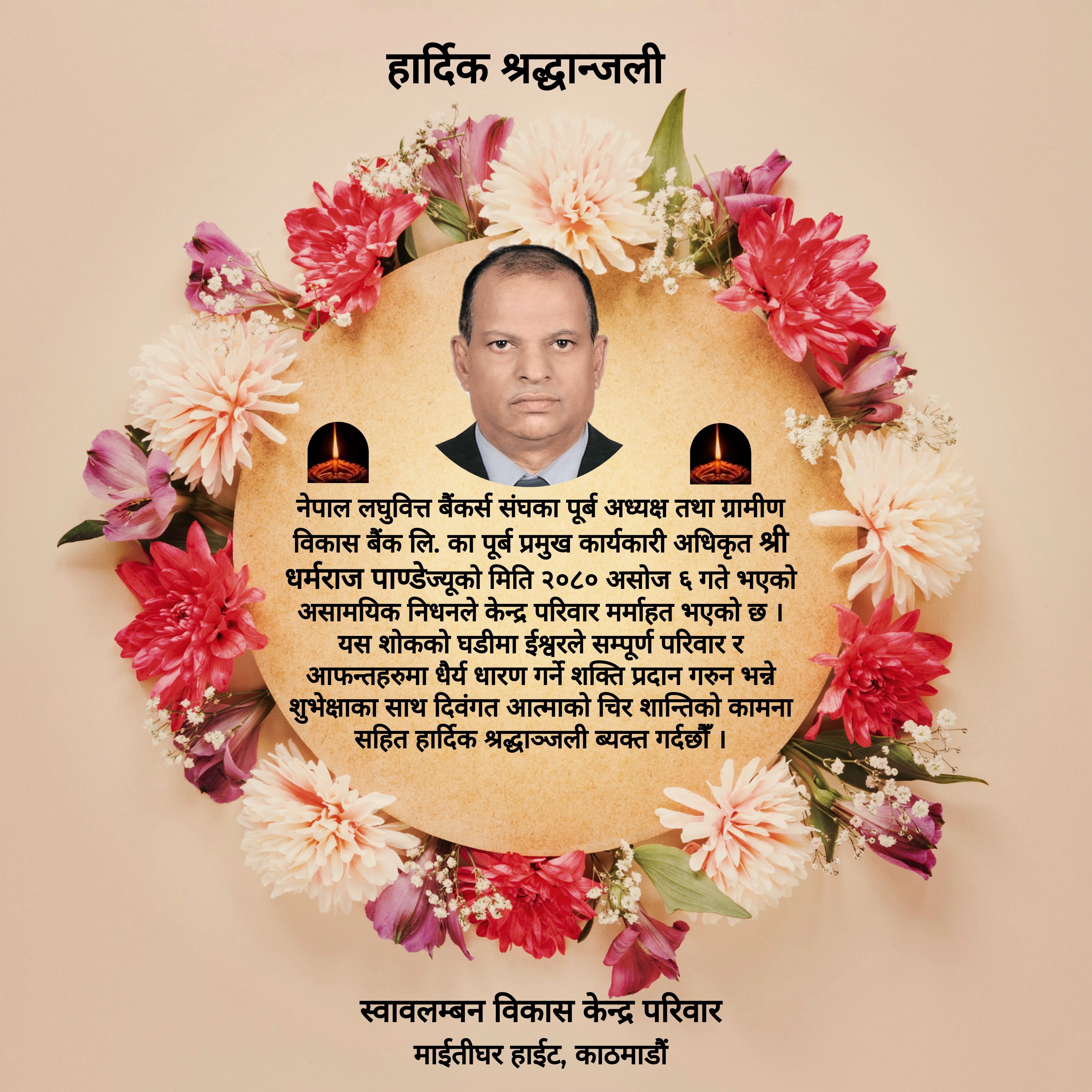A webinar on Neutralizing Corona Impact on Microfinance was organized by the Centre for Self-help Development (CSD) on May 13, 2021. The second wave of COVID-19 in Nepal is more lethal and devastating. An effect was also felt in the microfinance sector. The webinar was organized to discuss on the overall scenario of second wave of COVID-19 and its effect on microfinance sector as well as to determine future course of actions to be taken by the microfinance institutions (MFIs) and microfinance cooperatives (MCs). Seven panelists from MFIs and MCs representing each of the seven provinces of Nepal were invited as the panelists. They comprised of Mr. Sanjay Kumar Mandal Chief Executive Officer of the Jeevan Bikas Laghubitta Bittiya Sanstha Ltd representing province 1, Mr. Prabhu Narayan Chaudhary, Chairman of the Mahuli Laghubitta Bittiya Sanstha Ltd representing province 2, Mr. Uday Raj Khatiwada, Chief Executive Officer of the Swabalamban Laghubitta Bittiya Sanstha Ltd representing Bagmati Province, Ms. Bimala Yogi, Chief Executive Officer of the Jalpa Samudayik Laghubitta Bittiya Sanstha Ltd, representing Gandaki Province, Ms. Sharada Kumari Khatri, Chief Executive Officer of the Upakar Laghubitta Bittiya Sanstha Ltd, representing Lumbini Province, Mr. Bishal KC, Chief Executive Officer of the Bauddha Grameen Multipurpose Cooperative Ltd representing Karnali Province and Mr. Ganesh Bahadur Chand, Chief Executive Officer of the Udayadev Multipurpose Cooperative Ltd representing Sudur Paschim Province. The webinar panel discussion was moderated by Mr. Shankar Man Shrestha, Chairman of the CSD.
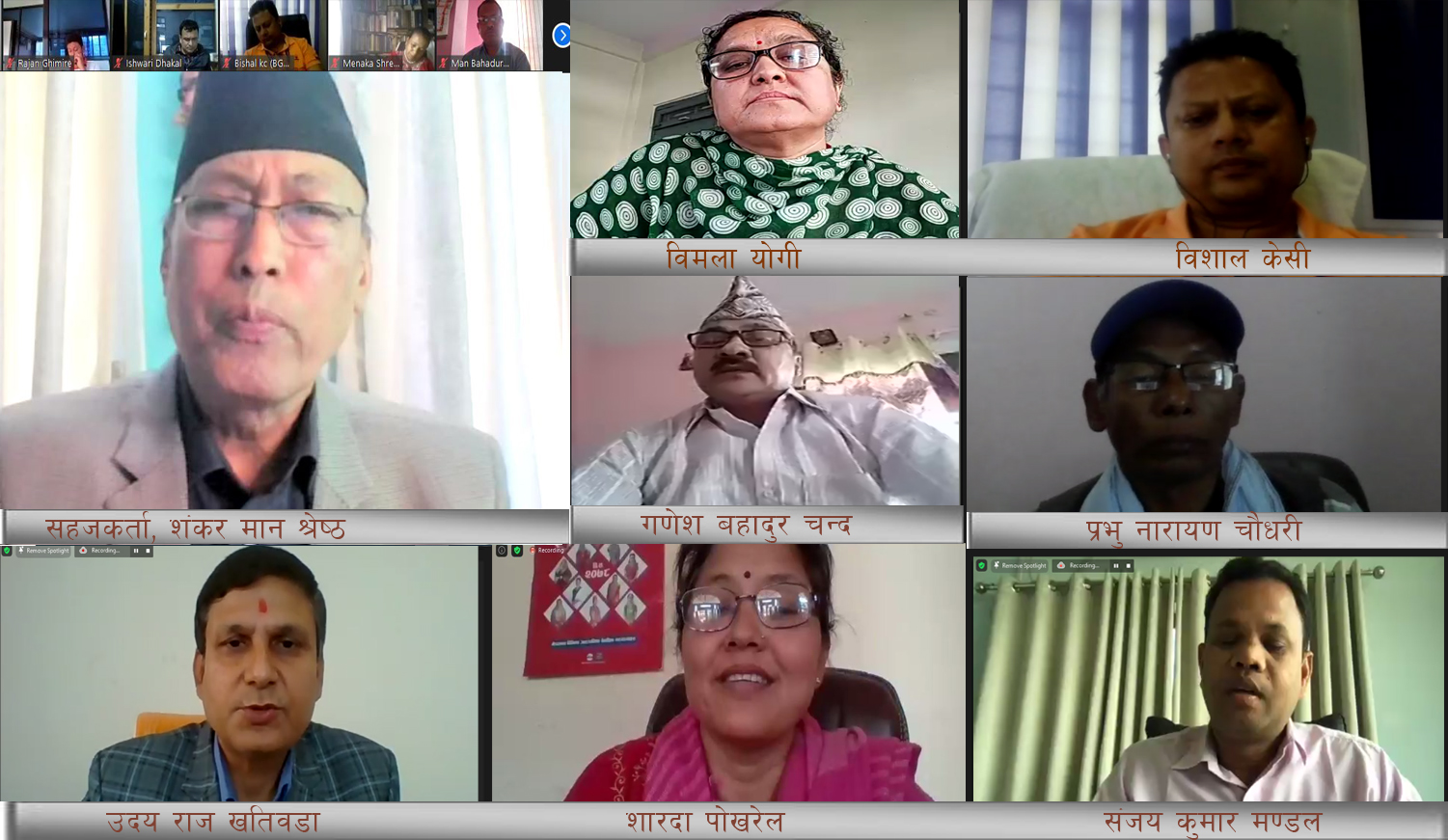
Opening the discussion, Mr. Shankar Man Shrestha said, “The major challenge of MFIs currently is how to keep their staff and members safe from infection of corona. Most have overlooked the menace of COVID-19 and continued to their business as usual. They should stop their movement to hotspot areas and stop their operation therein. Some have been reported to have practiced forced repayment in even this juncture. Coercive repayment practice should not be followed when the borrowers’ businesses are crippled.” He added, “Now is the time to keep oneself safe and sensitize members to remain safe following safety measures. Genuine members who have taken right amount of loan will repay their loan installments when the situation become favorable to run their enterprises/businesses. Similarly, the staff should not indulge in activities that may infect other staff members. They should make regular contact with their members by telephone to enquire about their safety, health conditions and availability of food stuff.”
In the panel discussion, while speaking of overall scenario of microfinance, current activities that are being implemented as well as future course of actions after the advent of the second wave of COVID-19, Mr. Sanjay Kumar Mandal, CEO of the Jeevan Bikas Laghubitta Bittiya Sanstha Ltd (JBLBL) said,” During the second wave of COVID-19, 9 staff and 64 clients of JBLBL are currently infected and two have died. In the meantime, 88 family members of clients have been infected and 4 of them have died due to the complications.” He also said, “The infection rate is less in rural areas in comparison to urban areas. We have been supporting the local people and creating awareness campaign in partnership with local government. In order to minimize the impact of COVID-19, digital transactions have been massively exercised. The digital transaction is promoted so that those members who have the capacity and means to pay will be able to repay their loan amount with minimal social contact with the outsiders. JBLBL has developed special apps for this. The Centre Chiefs are supporting the clients in operating the apps while repaying loan. Consequently, center meetings are not conducted at present.” He added, “JBLBL is providing medical aids like chawanprash, thermometer and providing infected members with cash worth of Rs 2000 and also supporting non-members with cash assistance of Rs. 500. The doctors from Jeevan Bikas Samaj’s staff also visit the infected members.” He also spoke about the modality of communication between the staff members where he said, “Front line staff make daily communications with the clients by telephone. Similarly, the branch make daily communications with the district level offices and the district level offices with the head office to apprise on the latest developments.”
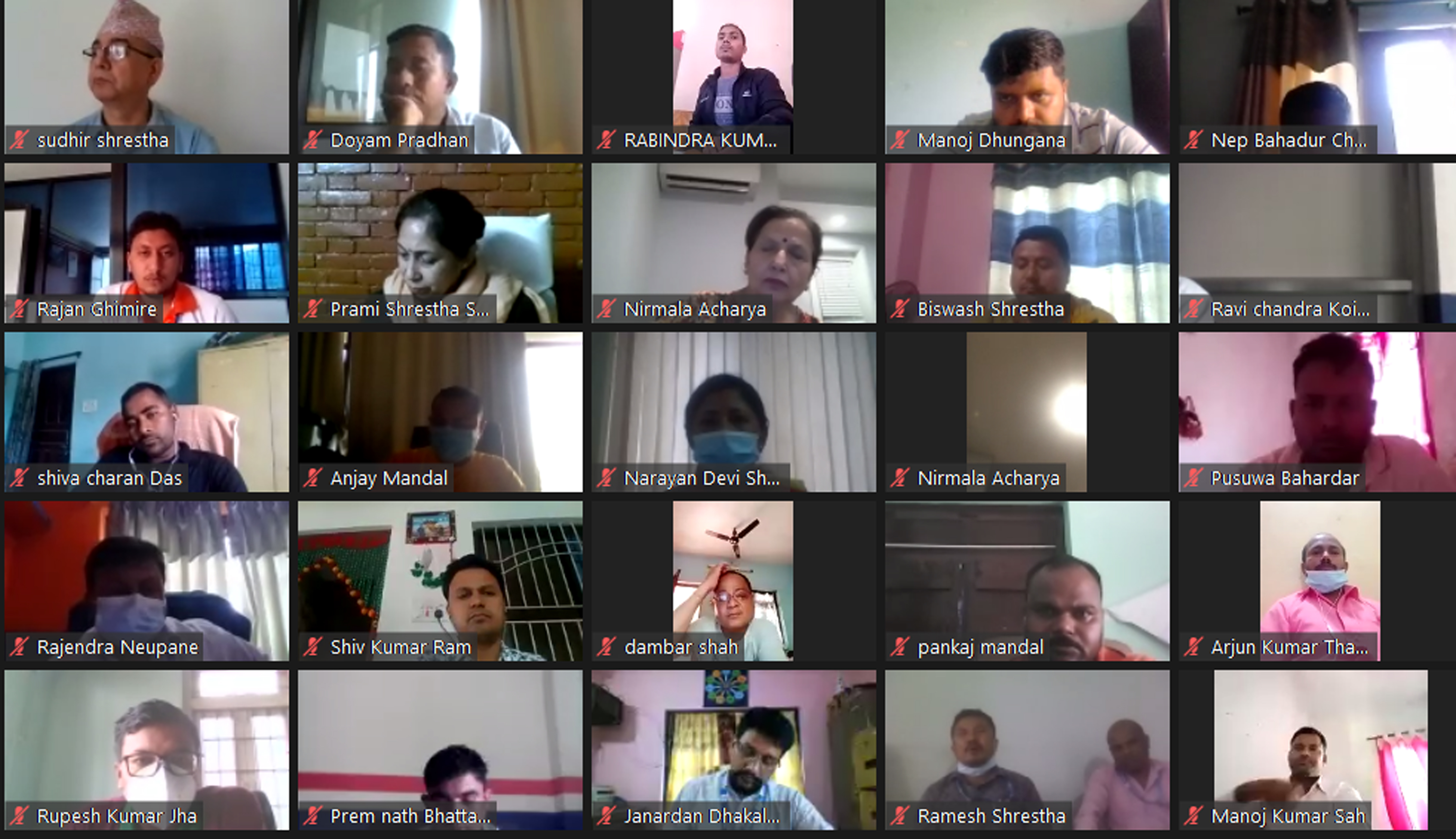
Another panelist Mr. Prabhu Narayan Chaudhary, Chairman of the Mahuli Laghubitta Bittiya Sanstha Ltd (MLBL) highlighted on the latest scenario and future course of actions of his organization. He said, “The situation in Province Number 2 is extremely vulnerable as the 8 districts have open border with India. In the first wave, 8 staff members were infected with COVID-19 but none has been infected in the second wave so far. Due to the statutory notice of the government, Centre Meetings have not been conducted for the time being. Currently head office is running with 20% and branch office with 25% staff of the total staff.” While mentioning about the status of loan repayment after the lockdown, he said, “The overdue loan from the first wave has not been recovered yet. We were still working on provisioning and loan detouring policy when the second wave hit. The situation in our organization is in dire condition because it is estimated that there is 32.6% clients duplication. Local businesses, shops and construction sector have also been closed which are major income sources of majority of our clients. This will negatively affect our loan repayment. Our agony has been further aggravated after this lockdown.” On positive note he said, “Since MLBL operates in rural areas, the impact of COVID-19 is not that severe.”
Mr. Uday Raj Khatiwada, CEO of the Swabalamban Laghubitta Bittiya Sanstha Ltd (SLBL) said, “After the first lockdown we developed a directive which focused on client sensitization process, staff safety plan which included insurance as well as code of conduct, providing masks, sanitizers and other materials. It also dealt with office safety measures to be taken by head office, area offices and branch offices.” In context of the spread of COVID-19 in his organization, he said, “In the first wave, 80 staff members were infected and in the second wave there are 124 staff members infected. The situation in some branches is so dire that all the staff members are infected by COVID-19.“ He said that the non-performing loan (NPL) of SLBL has increased as a result of COVID-19. He said further, “The infected clients and the families will get Rs. 1500 and if the client is hospitalized she will get Rs 10,000 from the Client Protection Fund. All the 251,000 members have access to Covid Helpline Number. The clients will be able to communicate with specialist doctors without any charge. The clients can also withdraw their savings if they need. The organization has planned to disburse business revival loan without service charge and without incorporating insurance scheme. A zoom meeting with Dr. Rabindra Pandey, Infectious Disease and Corona Specialist, was organized to acquaint the staff with COVID-19 symptoms and remedial measures. A total of 100 staff members, including those infected participated in this interaction meeting.”
Ms. Bimala Yogi, CEO of the Jalpa Samudayik Laghubitta Bittiya Sanstha Ltd (JSLL), also highlighted on the status as well as further course of actions of her organization after the advent of COVID-19. She said, “Currently 15 staff and 54 clients are infected by COVID-19.” Regarding the activities carried out to cope with the COVID-19, she said,” Sensitization of staff and clients on safety measures as well as distribution of masks and sanitizers to clients are continuing in the same way as it was carried out during the first wave of COVID-19. If a client is hospitalized due to COVID-19, a support of Rs. 10,000 is provided. Similarly, oximeters and thermometers have also been distributed to the clients. The organization has also facilitated clients and their neighbors in taking PCR test. The Centre Chiefs are currently working as the focal point of the centers. Green Shop, a subsidiary of the organization, has been used to make doorstep supply of food grains to the clients. The Centre Chiefs have been actively participating in supply of food grains, dairy products and vegetables to the clients at fair price. The organization has facilitated in arranging beds and oxygen cylinders to severe case patients of COVID-19. The shop also made and distribute PPE and masks worth Rs. 17,000. The masks produced by the members have also been exported to the United States of America. Similarly, psychological counselling is also provided to the clients in depression.” Regarding the work plan ahead, she said, “Since Dang has five hospitals but lacks ICUs, the organization is collaborating with locals to construct 50 bed hospital with oxygen facilities in Dang. With regard to creating youth employment, technical supports are provided to the potential entrepreneurs and marketing services for the meat and milk products of the members are provided through the branch offices at this juncture.”
Ms. Sharada Kumari Khatri, CEO of the Upakar Laghubitta Bittiya Sanstha Ltd (ULBSL), also highlighted on the activities carried out by her organization after the advent of second wave of COVID-19. She said, “Ministry of Land Management’s notice to landless families to fill up a form created rush which also increased infection rate of corona. As Banke district is hotspot of corona, 20 staff have been affected and 10 clients have died of COVID-19.” She said, “Last year we had provided COVID Loan with maximum limit of Rs. 10,000 for emergency purpose. The situation this time is graver than before. We are also working to provide higher package of Covid Loan and also work on digital banking as this has become necessity in Nepalgunj since clients of Upakar are afraid of leaving their houses.” She also said, “From May 15, 2021 we will contact all the Centre Chiefs and update clients on their health as well as economic conditions.”

Mr. Bishal KC, CEO of the Bauddha Grameen Multipurpose Cooperative Ltd (BGMC) highlighting on the current situation of his organization said, “We have not prioritized loan collection but focused on the welfare of the clients as well as the staff members. The subsidiary of the BGMC, Mineral Water Enterprise, is closed due to lockdown but Dairy Enterprise is carrying out its services. BGMC is planning to establish an Oxygen Plant in collaboration with local municipality which will help in supply of oxygen to hospital for critical patients. Loan collection has also been halted for the time being keeping in view of the probable health hazards to the staff and the members.”
Similarly, Mr. Ganesh Bahadur Chand, CEO of the Udayadev Multipurpose Cooperative Ltd (UMCL), briefed on the ground realities of COVID-19 and the activities carried out by his organization in Kanchanpur district after the advent of the second wave of COVID-19 and subsequent lockdown. He said, “UMCL has contributed Rs. 1 lakh to Mahakali Hospital for corona related activities and also contributed Rs. 10 lakh for oxygen cylinder management to Cooperative Campaign Fund. The objective of the fund is to support Mahakali Hospital for the treatment of corona patients. Currently 4 staff members have been infected and in the meantime 4 clients have also died due to COVID-19. The situation in Kanchanpur is grave because the infection rate is above 50% of PCR test cases. Regarding the financial support, Rs. 5000 will be given to COVID-19 infected clients. Similarly for staff members who have been infected by COVID-19, the organization will reimburse the payments incurred during the treatment. A total of Rs. 10 crore is set aside for business revival loan. The loan has a reduced interest rate of 13%. Previously, to increase the level of income of clients, Agriculture Loan was disbursed to 2500 members and 3 Junior Technical Assistants (JTAs) were also hired for providing technical supports. Currently 1500 members have taken loan and 2 additional JTAs have been recruited.” With regard to to marketing of agriculture products he said, “We are arranging marketing of vegetables directly to consumers avoiding involvement of middle-men so that producers are able to get fair price of their products.” He said, “Mobile banking has been promoted and loan up to Rs. 30,000 is given to the clients at their doorsteps.”
In his closing remarks, moderator Shrestha said, “Among the problems MFIs have been facing, 95% have been created by the institutions and the staff themselves and 5% related to regulatory arrangements that may require review of concerned regulatory agencies. The CEOs should have to update on number of clients infected, those who have mild symptoms and others who need critical care as well as those who have died due to COVID-19. Similarly, they should also update data on the clients who can survive in the current situation and those who need immediate support. Timely and appropriate information helps in formulation of proper policy, strategy and working mechanism. In the current situation, the hard core poor who cannot survive on their own and need immediate financial support should be provided support from Corporate Social Responsibility Fund.” He further added, “Information on grassroots situation is necessary in such pandemic. If there is good coordination with the grassroots, effective and timely rules will be developed which will cater the need of the poor.” In another context, he said, “The priority of MFIs should be to prevent and control the spread of corona through awareness raising on safety measures on prevention. We should not portray the current condition of loan default as sole corona inflicted problem. The default rate in the MFI sector was 12% before the advent of COVID-19 pandemic and it increased to 17% during the first wave of corona and subsequent lockdown and after the end of first wave the default rate came down to 15%. The default rate of 12% before the first wave of corona was very high in comparison to the trends anywhere else. We have been doing things that is contrary to the best practice tenets of microfinance. If we abide by best practice norms of microfinance, we will not face serious problems that acutely hamper the microfinance sector as a whole.”
Under the initiation of the principle Microfinance Institutions (MFIs) and co-ordination of the Centre for Self-help development (CSD) a first ever, national level 'National Microfinance more...
“Entrepreneurship Development, the Way towards Poverty Alleviation”
For the first time in the history of microfinance in Nepal, and unheard of in the global more...
In view of the stir created by the new Monetary Policy of the Nepal Rastra Bank (NRB) among the Microfinance Institutions (MFIs), the Centre for Self-help Development (CSD) felt the need more...
On Shrawan 28, 2073 (August 12, 2016) promoters, individuals and institution members, former Board Directors, Microfinance Institution leaders and friends came together at the Hotel Yellow more...
The Centre organized a two-day seminar for the Board Officials of the prominent microfinance cooperatives of Nepal on the request of various Cooperative Institutional Members of the Centre more...
‘Learning gives creativity, Creativity leads to thinking, Thinking provides knowledge, Knowledge makes you great’ – APJ Abdul Kalam
Kick starting the year 2017, the Centre for more...
On the morning of February 9, 2017 the Centre for Self-help Development (CSD) in joint collaboration with the Grameen Trust (GT), Bangladesh initiated a two-day program on the Grameen more...
A nine member team comprising Board of Directors from 2 FINGOs from Nepal, namely- Dhaulagiri Community Development Centre (DCRDC, Baglung) and Sreejana Community Development Centre (SCDC, more...
It is with deep sorrow and regret we bid farewell to Mr. Nanda Ram Baidya who passed away on August 15, 2017. In memory of the affable and ever encouraging figure the Centre for Self-help more...
On the morning of March 9, 2017 the Centre for Self-help Development organized an interaction program on an experience sharing session with Mr. Chandra Shekhar Ghosh, Founder and Managing more...
The Centre for Self- help Development (CSD) organized a training program titled "Advanced Training of Trainers" held in Kathmandu. The five day training program was held from September more...
Over the years, the Microfinance Institutions (MFIs) in Nepal have been proactive in providing financial as well as social services to vitalize the financially excluded households in more...
The pioneer microfinance institution of Nepal, the Centre for Self-help Development (CSD) convened its 26th Annual General Meeting on October 8, 2017 amidst its members, both individual more...
- An experience of Nepalese Delegation
A delegation of Nepalese microfinance officials visited the Philippines from January 15-19, 2018 on the invitation of the Microfinance Council of more...
CSD has appointed Mr. Bechan Giri as the new Executive Chief effective from December 26, 2017. Mr. Giri’s appointment comes with the resignation of former Executive Chief of CSD, Mr. more...
To enable microfinance institutions to apply sound accounting principles to ensure high quality of financial analysis the Centre for Self-help Development conducted a three-day training more...
- A Symposium of Board Officials
In over 25 years of service to the financially excluded segments of the society, the microfinance sector has thrived and expanded its outreach to the more...
Keeping in view the strong and rapid growth pattern in the microfinance sector and the competitive lending environment, CSD organized a three day training program titled "Training on Risk more...
“Learn as if you were to live forever” – Mahatma Gandhi
Realizing the immense potential to learn from each other through experience sharing and field visits within the country itself, more...
When the fundamentals of microfinance are followed, great outcomes are achieved. This is true with Bandhan Bank which has been given universal banking license by the Central Bank of India more...
Bangladesh is often hailed as the ‘Mecca of Microfinance’ across the world. The concept of micro-credit and the credit worthiness of the poor was first discussed by Prof. Muhummad Yunus in more...
One of the pioneering institutions to provide microfinance services in Nepal the first licensed NGO, the Centre for Self-help Development (CSD) celebrated its 27th Anniversary at a more...
The Centre for Self-help Development (CSD) one of the pioneers of microfinance in Nepal convened its 27th Annual General Meeting on October 26, 2018 in Kathmandu. The meeting was attended more...
A training to develop “Managerial Skills” of Branch Managers of MFIs was organized by CSD in Kathmandu from January 7-9, 2019 (Poush 23-25, 2075) to enhance managerial skill level of the more...
A one-day dialogue on microfinance was organized by Unique Nepal Laghubitta Bittiya Sanstha Ltd. on February 9, 2019 (Magh 26, 2075) in Hotel Atithi, Kohalpur. A total of 42 participants, more...
On the invitation of the Grameen Trust, Bangladesh a delegation of nine senior Nepalese microfinance practitioners led by Mr. Shankar Man Shrestha, Chairman of CSD visited Bangladesh from more...
The team observed that all the members are borrowers and strictly followed the basic fundamental of microfinance like conducting weekly meeting, implementing credit plus activities, more...
The microfinance sector in Nepal has been mushrooming at an alarming rate in the past five years. Newer microfinance institutions (MFIs) have sprung up, who do not necessarily follow the more...
“If we can turn unemployment into entrepreneurship, the amount of human creativity, talent and productivity we will unleash is almost beyond measuring” – Prof. Muhammad Yunus
Taking more...
The Centre for Self-help development (CSD) organized a conference on Human Resource Management for microfinance Institutions from Ashadh 10-11, 2076 in Dhulikhel, Kavre. The conference was more...
From June 28 – 29, 2019 over 1,500 delegates from across the world came together to celebrate and take forward social business on a global scale at the 9th Social Business Day (SBD) held more...
Microfinance has existed as one of the major contributors to poverty alleviation serving over 4 million members in the seventy seven districts of Nepal. But in recent times the sector has more...
One of the initiators of microfinance services and the first licensed microfinance NGO in Nepal, the Centre for Self-help Development (CSD) celebrated its 28th Anniversary at a function more...
The Centre for Self-help Development (CSD), which is one of the pioneer institutions to launch microfinance in Nepal, convened its 28th Annual General Meeting on December 13, 2019. The more...
The Centre for Self-help Development (CSD), which is one of the pioneer institutions to launch microfinance in Nepal, organized a Symposium on Fraud Control and Management on December 14, more...
CSD Chairman Mr. Shankar Man Shrestha felicitated on January 21, 2020 by the Agricultural Development Bank on the occasion of its 53rd Anniversary for his valuable contribution to the more...
With the rapid expansion of microfinance sector in past few years in Nepal, the sector has been facing numerous problems and challenges due to deviations from the true essence and more...
The Centre for Self-help Development (CSD) has entered in 30th year. It was established on August 13, 1991 (Shrawan 28, 2048) with the vision of alleviating poverty by raising the living more...
The Chairman of the Center for Self-help Development (CSD), Mr. Shankar Man Shrestha in a webinar organized by CSD on Bhadra 2, 2077 (August 18, 2020) urged the officials of Kisan more...
A webinar was organized by the Centre for Self-help Development on March 2, 2021 to acquaint development practitioners with basic concept of eco-village model, its approach and possible more...
CSD has expanded its team members to better coordinate and cope with the new activities as well strengthen the standard of its service delivery. It is very fortunate to have additional 5 more...
The extent of the damage that the novel coronavirus pandemic is causing is mind-boggling. However, the situation also offers us an unparalleled opportunity.We have experience in managing more...
The Sree Ram Higher Secondary School, Koshidekha, Panchkhal Municipality ward no 13, Kavrepalanchok district launched a student entrepreneurship development program in cooperation with the more...
The Centre for Self-help Development (CSD) has entered in 30th year. It was established on August 13, 1991 (Shrawan 28, 2048) with the vision of alleviating poverty by raising the living more...
CSD organized a virtual interaction with its member cooperative organizations on August2, 2020 to discuss on problems and challenges and opportunities arisen from the corona virus pandemic more...
Chairman of the Centre for Self-help Development Mr. Shankar Man Shrestha has suggested the microfinance staff to face the Corona epidemic and lockdown crisis while maintaining the essence more...
The Chairman of the Center for Self-help Development (CSD), Mr. Shankar Man Shrestha in a webinar organized by CSD on Bhadra2, 2077 (August 18, 2020) urged the officials of Kisan more...
The Center for Self- help Development (CSD) organized a 3 day PPI Training of Trainers (TOT) to 23 senior officials and branch managers of microfinance institutions in Biratnagar in more...
The Centre for Self-help Development (CSD) organized a study/exposure visit to Bangladesh from March 19-26, 2023. The visit team consisted of nine Board Members and one staff member of more...
The Chairman of the Centre for Self-help Development (CSD) Mr. Shankar Man Shrestha has suggested the microfinance practitioners to study and review the problems and opportunities faced more...
The Centre for Self-help Development (CSD) has instituted Micro-Entrepreneurship Award for three outstanding micro-entrepreneurs from among the women members MFIs. The award carries Rs. more...
Centre for Self-help Development (CSD) organized two day of Virtual training on "Promotion and Development of Micro-entrepreneurship among microfinance Members" on November 24-25, 2020 more...
During the lockdown period, the Centre for Self-help Development (CSD) conducted online interactions with CEOs and Department Heads of its member organizations. A total of six online more...
The Centre for Self-help Development (CSD) convened its 29th Annual General Meeting (AGM) on November 27, 2020 (Marg 12, 2077). The AGM was attended by 9 individual and 38 institutional more...
CSD Chairman Mr. Shankar Man Shrestha felicitated on January 20, 2020 by SLBBL on the occasion of its 19th Anniversary for his valuable contribution to the creation and development of the more...
CSD organized two day virtual training on "Identification and Development of Micro-Entrepreneur Members" from Magh18-19,2077, (Jan31-Feb1, 2021) where17 branch managers and senior field more...
The Centre for Self-help Development (CSD) has provided a desktop computer with necessary accessories to Kunchipwakal Secondary School under the Tarkeshwor Municipality-1, Kathmandu in its more...
The Centre for Self- help Development (CSD) organized a virtual webinar on “Sharing Grameen Bank Experience on Managing Impact of COVID 19 Pandemic and Post COVID Programs” on 20th January more...
The Centre for Self-help Development (CSD) awarded three best Microfinance Entrepreneurs members with the title of “Best Micro-entrepreneur Award-2076.” Honorable Minister for Land more...
The Chairman of the Centre for Self-help Development (CSD) Mr. Shankar Man Shrestha handed over a cheque of Rs. 2 lakh to the Samata Education Trust on March 9, 2021 as a token of support more...
On March 05, 2021 (Falgun 21, 2077) the Centre for Self-help Development (CSD) successfully completed a review webinar on the action plan developed by participating branch managers of more...
The Center for Self-help Development (CSD) conducted a two–day training on “Leadership Development and Stress Management” in microfinance on March 18-19, 2021 (Chaitra 05-06, 2077). The more...
With the main objective of knowing the knowledge and skill gained during the training "Gear up yourself" which was held on January 18-19, 2021(Magh 5-6, 2077) is practically applicable to more...
The Centre for Self-help Development (CSD) conducted a two-day virtual training on "Identification and Development of Micro–entrepreneur Members in Microfinance on March 14-15, more...
CSD on Chaitra 02, 2077 (March 15, 2021) hosted yet another webinar as part of Experience Sharing forum for microfinance institutions officials. This webinar talk program was participated more...
A webinar was organized by the Centre for Self-help Development (CSD) on March 30, 2021 to apprise microfinance practitioners and other stakeholders on problems and effects caused by more...
The Centre for Self-help Development (CSD) organized a webinar talk on April 16, 2021 to sensitize microfinance practitioners and other stakeholders on policy level as well as practical more...
A webinar talk on Vitality and Vulnerability of Wholesale Lending Organizations in the Present Niche Market of Microfinance was organized by the Centre for Self-help Development (CSD) on more...
A webinar on Neutralizing Corona Impact on Microfinance was organized by the Centre for Self-help Development (CSD) on May 13, 2021. The second wave of COVID-19 in Nepal is more lethal and more...
A webinar talk program on “Happy Leaders Can Change the World” was organized by the Centre for Self-help Development (CSD) on May 31, 2021 with the aim to to discuss on the concept of more...
A webinar talk (Series No 9) on Secrets of Success in Microfinance was organized by the Centre for Self-help Development (CSD) on June 16, 2021. The webinar focused on philosophy and more...
The leaders in the field of microfinance are of the view that a time has come for all microfinance institutions to digitize microfinance services to provide easy access to the deprived and more...
Microfinance has completed a three-decade long journey in Nepal. With continuous campaigns, it had brought awareness among the poor women in rural Nepal. Microfinance practitioners have more...
Four institutional members of the Centre for Self-help Development (CSD) have been accredited by the international “Smart Campaign, Client Protection Certification.” The awardees are the more...
The Training of Trainers (ToT) aiming to spread covid-19 education among the community was organized jointly by the Centre for Self-help Development (CSD) and RMDC Laghubitta Bittiya more...
Expressing concern over the growing discrepancies and deviations in microfinance, experts have warned microfinance practitioners and stakeholders to be vigilant in time. In the webinar more...
The Centre for Self-help Development (CSD) established in 1991 with the objectives of creating poverty free self-help society through awareness rising and of the masses and mobilization of more...
The Centre for Self-help Development (CSD) has organized two days long training on Participatory Rural Appraisal (PRA) on August 20-21, 2021 for the 16 high officials of the Centre for more...
The Centre for Self-help Development (CSD) had initiated a new approach to the follow-up of the training conducted by it with a view to ensure that the skills learned by the training are more...
A webinar talk series (Episode 14) on “Microfinance Policies, Practices and Problems in Sri Lanka” was organized by the Centre for Self-help Development (CSD) on September 6, 2021, with more...
The Centre for Self-help Development (CSD) held a six-month progress review of its second training on "Identification and Development of Micro-entrepreneurs" on September 12, 2021, which more...
A virtual Master Training of Trainers (ToT) to educate communities on COVID-19 via ZOOM was jointly organized by the Centre for Self-help Development (CSD) and RMDC Laghubitta Bittiya more...
Experts have argued that the lack of good governance in Microfinance Institutions (MFIs) has led to deviations from its main mission of serving the lower strata of the population and more...
Microfinance institutions have a strong belief that their grass-root level financial inclusion program has bestowed the fight against global challenges such as poverty, unemployment, and more...
A tripartite agreement on "Self-help Eco-village Development" was signed between the Centre for Self-help Development (CSD), the Mahila Sahayogi Bachat Tatha Rin Sahakari Sanstha Ltd. more...
The Centre for Self-help Development (CSD) convened its 30th Annual General Meeting (AGM) on December 2, 2021 (Marg 16, 2078). The AGM was attended by 6 individual and 26 institutional more...
On 13th of December 2021, the Centre for Self-help Development (CSD) put forward its 17th episode of webinar entitling "Human Resource Development and Management in Microfinance more...
CSD organized a two day "Mindful Leadership Development" Program for the Chairperson, CEOs and DCEOs of Microfinance Institutions and Cooperatives operating microfinance program from more...
The Centre for Self-help Development (CSD) organized a webinar talk on “Experience of Grameen Koota on Poverty Reduction and Employment Creation in India” to acquaint microfinance and more...
The Centre for Self-help Development (CSD) has organized a two-day leadership development training to increase women participation in management decision level of the Microfinance with more...
Kathmandu. Three women entrepreneur members who became successful entrepreneurs by taking loans from different microfinance institutions have been awarded the Best Micro-Entrepreneur more...
A webinar talk (episode no. 19) on “Entrepreneurship Development among Students-An Experience of Janajyoti Higher Secondary School, A Rural School of Surkhet District” was organized by the more...
The Sree Ram Higher Secondary School, Koshidekha, Panchkhal Municipality ward no 13, Kavrepalanchok district launched a student entrepreneurship development program in cooperation with the more...
The Centre for Self-help Development (CSD) convened 12th Social Business Day 2022, Country Forum of Nepal on June 29, 2022 based on the theme, “Building a New Civilization-Before the more...
The Centre for Self-help Development (CSD) which is the pioneer NGO in microfinance sector celebrated its 31st anniversary on 13th August, 2022 (Shrawan 28, 2079). During the occasion, more...
The Centre for Self-help Development (CSD) organized three Exposure Visits of microfinance practitioners of different Microfinance Institutions (MFIs) and Microfinance Cooperative more...
CSD organized a week long exposure/study visit of Nepali MFIs to Socialist Republic of Vietnam from August 13 to 20, 2022 to learn the microfinance policies, programs, approaches and more...
The Centre for Self-help Development (CSD) in partnership with the University of New South Wales (UNSW), Sydney, Australia, organized a seminar on the topic "Emerging Challenges and more...
Branch managers and employees of microfinance institutions were encouraged to mobilize more resources in their hands for reliability of financial resources supporting for lending the more...
A review program was conducted on February 27, 2023 with the participation of the heads of MFIs to discuss the latest status and progress on the implementation of 11-point declaration of more...
A five-day specially tailored program on entrepreneurship development was organized by Centre for Self-help Development (CSD) for the Branch Managers of Swabalamban Laghubitta Bittiya more...
Convoked 31st General Assembly of CSD: Emphasized on Promotion of Social Entrepreneurship and Expansion of Microfinance Reach to Hard-Core Poor
The 31st General Assembly of the Centre more...
The 31st General Assembly of CSD has elected a seven-member Board of Directors for the next two years. In this committee, the elected members are: the founding members of CSD, Mr Shankar more...
The Center for Self- help Development (CSD) organized a 3 day PPI Training of Trainers (TOT) to 23 senior officials and branch managers of microfinance institutions in Biratnagar in more...
Experts are of the view that the 8-point directive of the Nepal Rastra Bank (NRB) will help to improve the quality as well as the strength of the microfinance sector in long term and bring more...
The Centre for Self-help Development organized an online orientation program on “Progress out of Poverty (PPI) Index” on November 8, 2022. The objective of the program was to orient more...
In the last two decades microfinance in Nepal has taken a big leap forward in terms of the number of institutions providing loans, volume of loan transactions and the number of client more...
The First Provincial Microfinance Members' Summit of the Koshi Province was concluded with the vow to make microfinance services civilized, dignified and effective and also decided to more...
The Centre for Self-help Development (CSD) organized a 4 day field based Self-help Eco-village Development workshop from January 29 to February 1, 2023 at Dhulikhel Lodge Resort, more...
The Centre for Self-help Development (CSD) has initiated an entrepreneurship development program with the aim of developing about 5,000 entrepreneur women among microfinance members within more...
The Centre for Self-help Development (CSD) organized a study/exposure visit to Bangladesh from March 19-26, 2023. The visit team consisted of nine Board Members and one staff member of more...
On the occasion of 32nd Anniversary of the Centre for Self-help Development held on August 13, 2023, MFIs and microfinance practitioners who have made outstanding contribution in providing more...
Shankar Man Shrestha Microfinance Award is provided to any individual or institution that adheres to the norms, principles and values of microfinance and acts as a role model in carrying more...
The Centre for Self-help Development (CSD) awarded Micro-entrepreneurship Development Award and Best Entrepreneurs award for the year 2023 2023 on the occasion of its 32nd Anniversary more...
In a proactive effort to fortify the microfinance sector, the Centre for Self-help Development (CSD) orchestrated a successful three-day training program titled "Internal Audit & Control" more...
On the occasion of 4th Nation Microfinance Member Summit 38 MFIs members, staffs, centre chief, 3 Zero Club were recognized & appreciated. Where 11 Centre Chief, 1 organization, 10 Staff, more...
The 32nd Annual General Meeting of the Centre for Self-help Development (CSD) was held on Sunday, December 10, 2023. The meeting decided to urge MFIs and MFCs to work to improve the more...
The Centre for Self-help Development (CSD) which is the pioneer NGO in microfinance sector in Nepal celebrated its 32nd anniversary on 13th August, 2023 (Shrawan 28, 2080).
With the theme “Prudent Microfinance, Prosperous Members”, the 4th National Microfinance Members' Summit, Nepal concluded with the issuance of a comprehensive 12-point declaration, more...
(1).jpg)
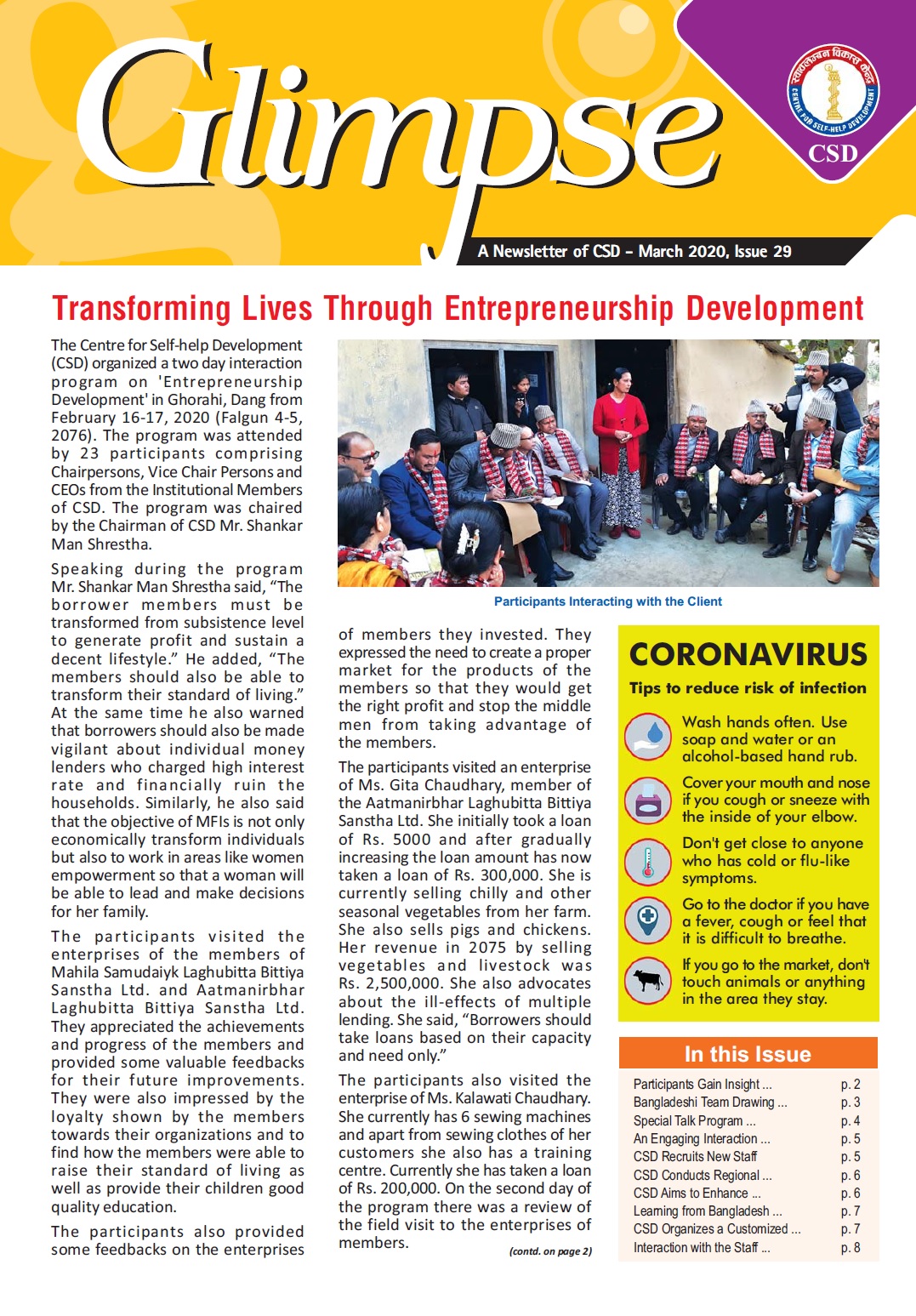
.jpg)
